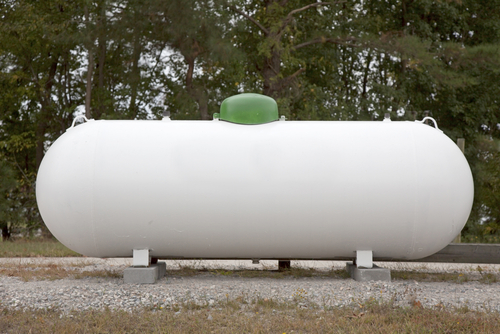 Choosing a propane tank is one of the first decisions you will have to make for your propane-powered home – but it’s also one of the most important.
Choosing a propane tank is one of the first decisions you will have to make for your propane-powered home – but it’s also one of the most important.
To make the options a little clearer for you, here is a short guide to three important things you’ll need to consider when it comes time to choose a residential propane tank: shape, size, and whether you should lease or buy your tank.
Shape
Aboveground propane tanks come in two basic types: horizontal tanks and vertical cylinders. Horizontal propane tanks (sometimes called “torpedo tanks”) are large, high-capacity containers typically used where propane is the main source of heat. Their larger capacity reduces the need for winter propane deliveries, which can help in areas where weather is unpredictable. Vertical propane cylinders are generally smaller, so they can be placed out of sight against a building or near a property line.
Size
Aboveground propane tanks come in sizes ranging from 120 to 1000+ gallons; smaller portable propane tanks are also available. Some common propane tank sizes are:
Lease vs. own
The decision of whether to lease or buy your propane tank is an important one; each option has its advantages and disadvantages.
When you buy a propane tank, you have complete control over who supplies your propane, can choose a tank from any manufacturer rather than being limited to tanks your supplier carries, and run no risk of your propane supplier seizing your propane tank in the event of a billing dispute.
On the other hand, when you purchase your own propane tank, you are completely responsible for all propane tank installation and maintenance tasks, including repair, replacement, and parts. You are also responsible for periodic tank recertification according to local and state laws, along with any fees charged by your supplier for using a tank that they don’t maintain and didn’t install.
When you lease a propane tank, on the other hand, the supplier is generally on the hook for all costs associated with installing and maintaining your tank, including repair costs. Suppliers also will often offer preferred propane rates to customers who lease. On the negative side, when you lease your tank, you are bound to your supplier for as long as the tank remains in place.
Choosing a propane tank isn’t always straightforward, and making the right decision is an important one for your propane powered home. If you’re not sure what type or size of propane tank you need for your North Carolina home, give us a call – whether you want to upgrade and existing tank to avoid too-frequent fill-ups, add a tank for a new home addition, or perform a whole house propane conversion, our experts will help you find a solution that meets your space, lifestyle, and budget needs.
For expert propane tank installations for your home or business in Greene, Lenoir, Pitt, Wayne, Wilson, Craven, and Jones counties, NC, trust the pros at Rand Wade Oil. Contact us today to learn more!